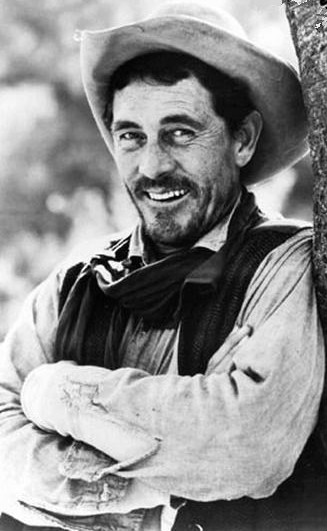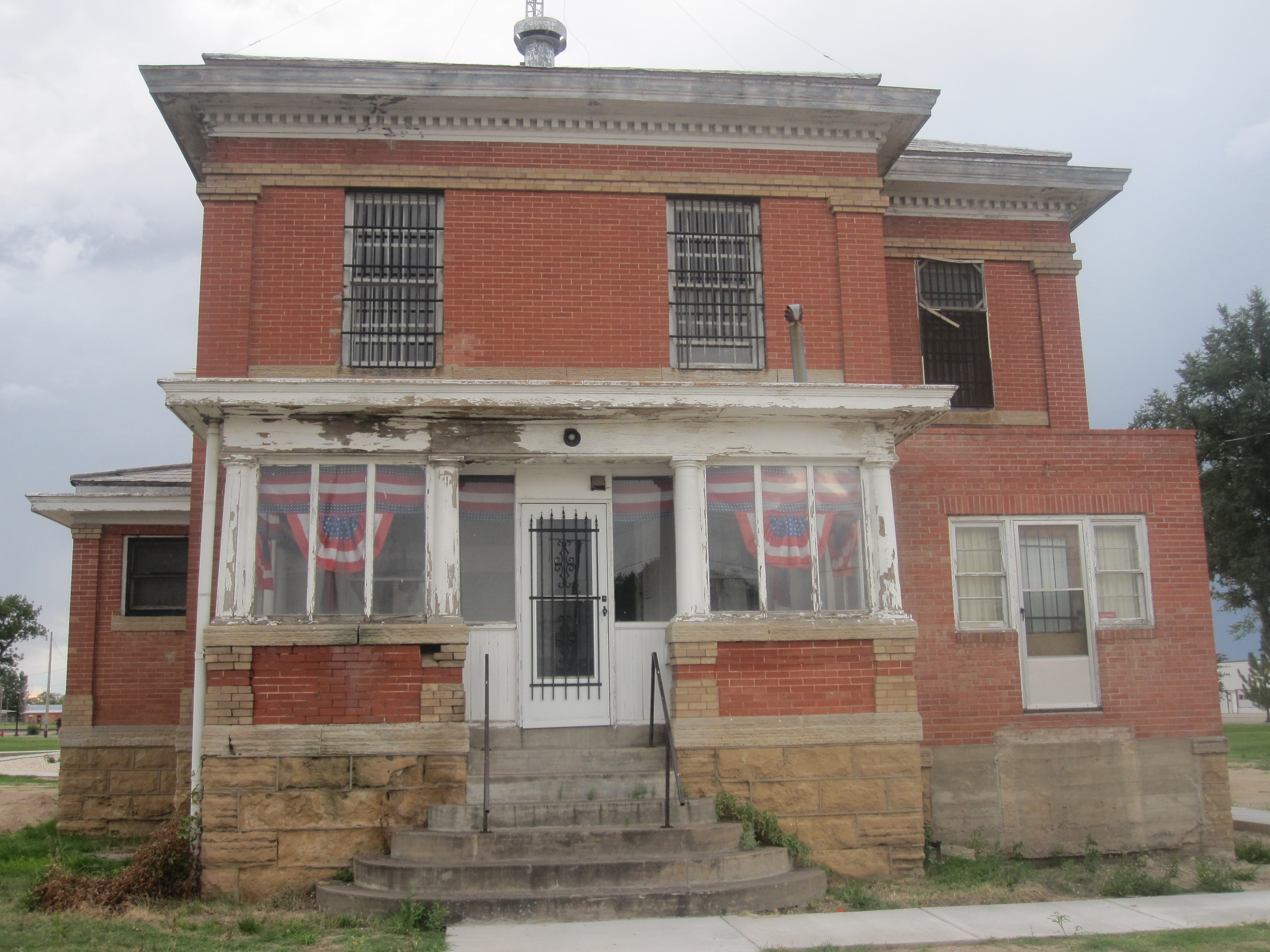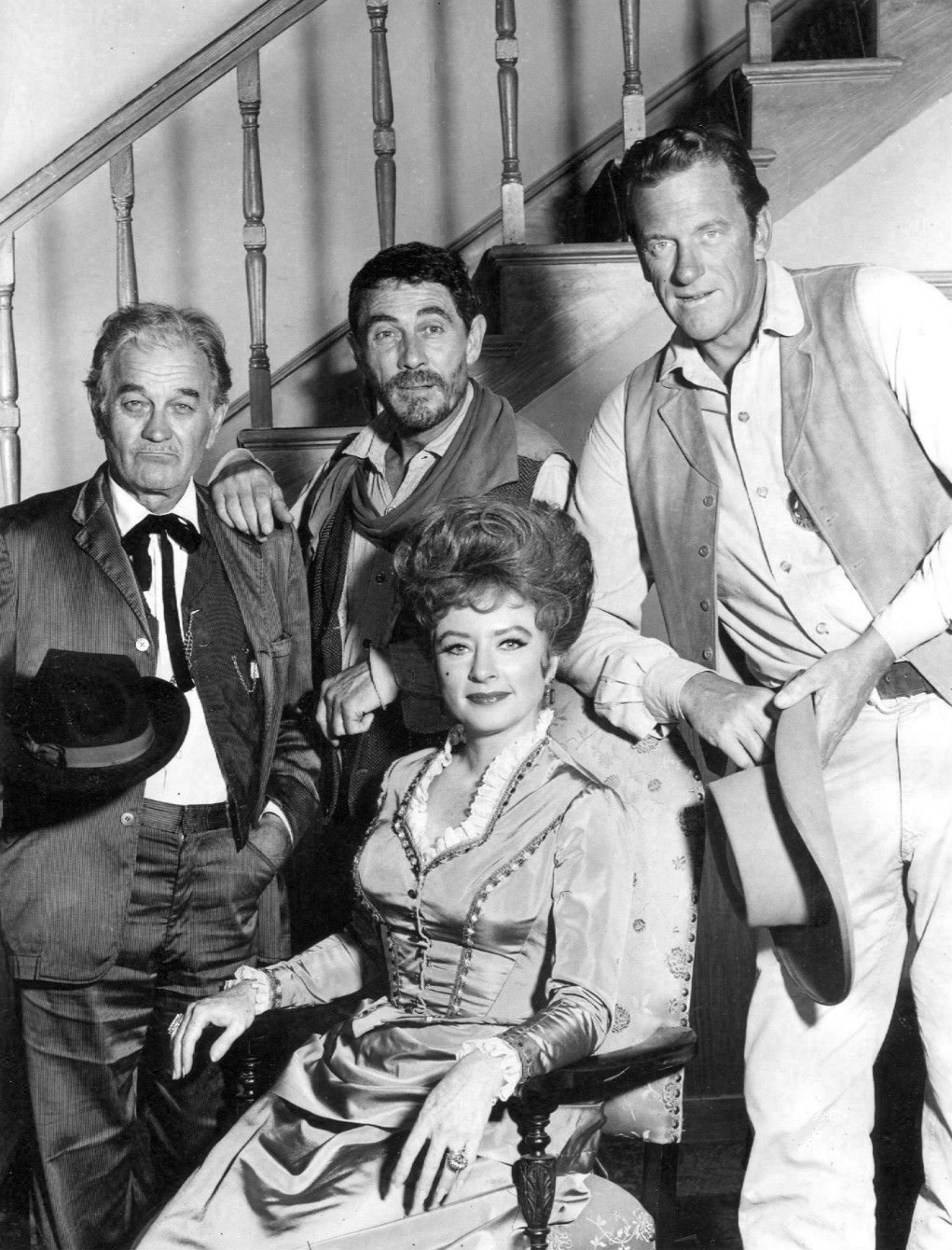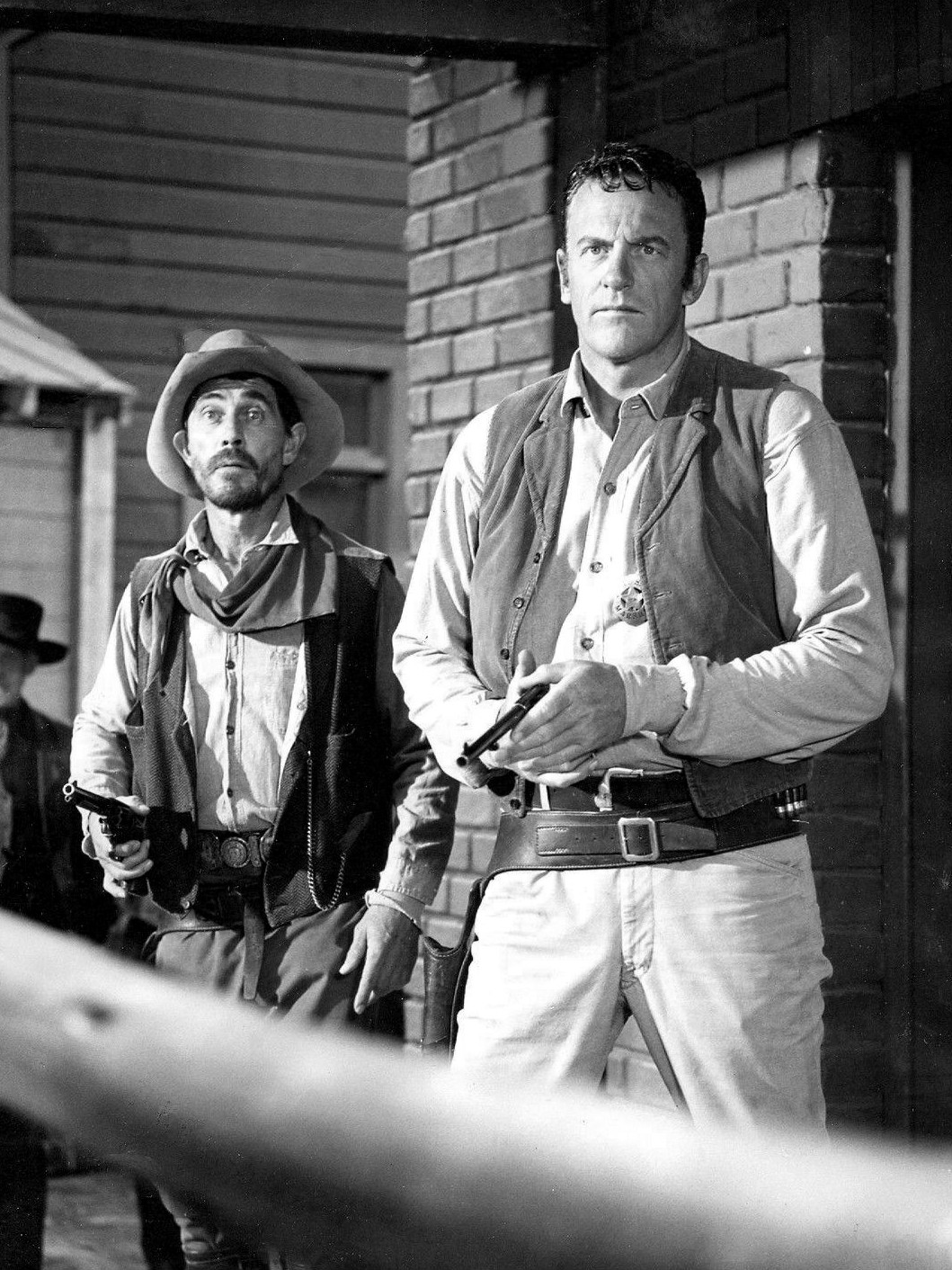1. Overview

Ken Curtis, born Curtis Wain Gates on July 2, 1916, in Lamar, Colorado, was an American actor, singer, musician, and film producer, most famously known for his portrayal of Festus Haggen on the long-running Western television series *Gunsmoke*. His career spanned decades, during which he significantly contributed to American entertainment through his distinctive musical talents, particularly with the Sons of the Pioneers, and his memorable acting roles in both film and television. Curtis's work, especially his iconic character on *Gunsmoke*, left a lasting impact on the Western genre and popular culture. He died on April 28, 1991, in Fresno, California.
2. Early life and background
Ken Curtis's early life on a ranch and his family's move to Las Animas provided the formative experiences that would later influence his professional career, particularly his connection to the American West.
2.1. Birth and childhood
Ken Curtis was born Curtis Wain Gates on July 2, 1916, in Lamar, Colorado, located in Prowers County in southeastern Colorado. He spent his first ten years on a ranch situated on Muddy Creek in the eastern part of Bent County. In 1926, his family relocated to Las Animas, which serves as the county seat of Bent County. This move was prompted by his father, Dan Sullivan Gates, who successfully ran for sheriff, serving in the role from 1926 to 1931.

2.2. Education and military service
During his time at Bent County High School, Curtis was an active student, playing as the quarterback for the school's football team and performing on the clarinet in the school band. He successfully graduated in 1935. After high school, Curtis briefly attended Colorado College with intentions of studying medicine. However, he soon left his studies to pursue his passion for music. Later, during World War II, Curtis served in the U.S. Army from 1943 to 1945.
3. Career
Ken Curtis's professional journey was notably diverse, encompassing a successful music career, significant roles in Hollywood films, and an enduring presence on television, culminating in his most recognized role.
3.1. Music career
Curtis began his professional career as a singer, often blending his musical talents with his acting roles once he entered the film industry. In 1941, he was part of the renowned Tommy Dorsey band, where he took over as vocalist, succeeding Frank Sinatra, before Dick Haymes eventually replaced Sinatra in 1942. It was Dorsey who suggested that Gates adopt the stage name Ken Curtis. Following his time with Dorsey, Curtis joined Shep Fields and His New Music, a distinctive band that relied entirely on a reed section, foregoing brass instruments.
In 1943, Curtis married Lorraine Page, who was also under contract at Universal Studios. By 1948, Curtis had become a featured singer and host on the long-running country music radio program, WWVA Jamboree. His most prominent musical engagement was with the Sons of the Pioneers, where he served as a lead singer from 1949 to 1953 and again from 1955 to 1957. During his tenure with the group, he contributed to hit songs such as "Room Full of Roses" and "(Ghost) Riders in the Sky".
3.2. Film career
Curtis's film career began in 1945 when Columbia Pictures signed him to a contract. Early in his acting career, he starred in a series of musical Westerns alongside the Hoosier Hot Shots, often cast as a singing cowboy romantic lead.
Through his second marriage, Ken Curtis became the son-in-law of acclaimed film director John Ford. This connection led to significant collaborations with Ford and actor John Wayne. Curtis appeared in Ford's films, including Rio Grande (1950), where he sang as part of the fictional band "The Regimental Singers" (which was actually the Sons of the Pioneers), although he was uncredited as a principal cast member. He is particularly remembered for his role as Charlie McCorry in The Searchers (1956). His other notable appearances in Ford's films include The Quiet Man (1952), The Wings of Eagles (1957), The Horse Soldiers (1959), The Alamo (1960), and How the West Was Won (1962). Curtis also worked with Ford, Henry Fonda, James Cagney, William Powell, and Jack Lemmon in the classic Navy comedy Mister Roberts (1955), where he played Yeoman 3rd Class Dolan.
Additionally, Curtis was featured in all three films produced by Cornelius Vanderbilt Whitney's C. V. Whitney Pictures: The Searchers (1956), The Missouri Traveler (1958) alongside Brandon deWilde and Lee Marvin, and The Young Land (1959) with Patrick Wayne and Dennis Hopper. In 5 Steps to Danger (1957), he had an uncredited role as FBI Agent Jim Anderson. Beyond acting, Ken Curtis ventured into film production, producing two low-budget monster films in 1959, The Killer Shrews and The Giant Gila Monster.
3.3. Television career
Before and during his long-running role on *Gunsmoke*, Ken Curtis made numerous guest appearances and held recurring roles in various television series. He guest-starred five times on the Western series Have Gun - Will Travel with Richard Boone. In 1959, he appeared as the cowhand Phil Jakes in the *Gunsmoke* season four episode, "Jayhawkers", one of several appearances on the show before becoming a regular cast member.
On November 5, 1960, he guest-starred as circus performer Tim Durant on an episode of Perry Mason titled "The Case of the Clumsy Clown". From 1961 to 1963, Curtis was a main cast member in Ripcord, a syndicated action/adventure series focused on skydiving. He played James (Jim) Buckley, a skydiver, alongside Larry Pennell who played his young protégé, Theodore (Ted) McKeever. This series, comprising 76 half-hour episodes, helped to generate widespread interest in the sport of parachuting. In 1964, Curtis appeared as muleskinner Graydon in the "Graydon's Charge" episode of the syndicated Western television series, Death Valley Days, which also featured Denver Pyle and Cathy Lewis.
Beyond his Western roles, Curtis diversified his performances. He voiced Nutsy the Vulture in Disney's 1973 animated film Robin Hood. A decade later, he returned to television in the short-lived Western series The Yellow Rose (1983-1984), where he frequently performed scenes with Noah Beery, Jr.. Later in his career, he guest-starred as a retired police detective named Tom McCaul on Carroll O'Connor's NBC program In the Heat of the Night in 1990. His final acting role was as Seaborn Tay, an aging cattle rancher, in the 1991 television film Conagher, based on the Western novel by Louis L'Amour. In this film, he appeared alongside Sam Elliott and his former *Gunsmoke* co-star Buck Taylor (who played Newly O'Brien on *Gunsmoke*). Buck Taylor's father, Dub Taylor, had a minor role in it.
3.4. Gunsmoke role

Ken Curtis is most widely recognized and celebrated for his long-running role as Festus Haggen, the scruffy, cantankerous, and often illiterate deputy on the iconic Western series Gunsmoke. He officially joined the regular cast of *Gunsmoke* in 1964, taking over the role of deputy following the departure of Chester Goode, who was played by Dennis Weaver. Among the five different deputies who served under Marshal Matt Dillon throughout the series' two-decade run, Festus Haggen held the position for the longest period-eleven years, appearing in a remarkable 304 episodes.

The character of Festus Haggen was reportedly inspired by "Cedar Jack" (Frederick Munden), a real-life individual from Curtis's childhood in Las Animas. Cedar Jack, who resided about 15 mile south of the town, earned his living by cutting cedar fence posts. Curtis frequently recalled how Jack would visit Las Animas, often getting intoxicated and ending up in the jail run by Curtis's father, the county sheriff. For the role of Festus, Curtis developed a distinctive nasally, twangy, rural accent, which became a hallmark of the character and contributed significantly to his memorability, though it did not reflect Curtis's natural speaking voice.
Beyond his work on the show, Curtis actively promoted *Gunsmoke* through various personal appearances. He also traveled extensively across the country, performing in Western-themed stage shows at fairs, rodeos, and other venues when *Gunsmoke* was not in production, continuing these performances for several years even after the show's cancellation. In addition to his entertainment activities, Curtis was involved in politics, campaigning for Ronald Reagan in 1976 during Reagan's initial attempt to secure the Republican presidential nomination against incumbent Gerald Ford.
4. Personal life
Ken Curtis was married twice. His first marriage was to Lorraine Page in 1943. He later married Torrie Connelly in 1966. Their marriage lasted until his death in 1991, and he gained two step-children through this union. In his later years, Curtis resided in Clovis, California, in Fresno County. Politically, Curtis was a Republican. He actively supported Barry Goldwater in the 1964 United States presidential election and campaigned for Ronald Reagan during Reagan's 1976 bid for the Republican presidential nomination.
5. Death
Ken Curtis died in his sleep on April 28, 1991, from a heart attack, in Fresno, California. Following his death, he was cremated, and his ashes were scattered across the flatlands of his home state of Colorado.
6. Legacy and impact
Ken Curtis's legacy is defined by his significant contributions to both music and acting, particularly his enduring portrayal of Festus Haggen, which cemented his place in American popular culture.
6.1. Honors and recognition
In recognition of his extensive contributions to the Western genre, Ken Curtis was inducted into the Western Performers Hall of Fame at the National Cowboy & Western Heritage Museum in Oklahoma City, Oklahoma, in 1981. A lasting tribute to his most iconic role can be found in Clovis, California, where a statue of Ken Curtis as Festus Haggen is prominently displayed at 430 Pollasky Avenue, in front of the Educational Employees Credit Union.
6.2. Cultural significance
Ken Curtis's work, particularly his portrayal of Festus Haggen on *Gunsmoke*, had a profound cultural impact, establishing the character as one of the most recognizable and beloved figures in television Westerns. His unique blend of musical talent and character acting contributed significantly to the charm and longevity of the Western genre in both film and television. The authenticity and humor he brought to Festus ensured the character's enduring popularity, making Curtis a memorable figure in American entertainment history.
7. Filmography and television roles
This section provides a comprehensive list of Ken Curtis's notable appearances in film and television throughout his career.
7.1. Film
- Santa Fe Trail (1940) - Officer singing at celebration (uncredited)
- Rhythm Round-Up (1945) - Jimmy Benson
- Song of the Prairie (1945) - Dan Tyler
- Out of the Depths (1945) - Buck Clayton
- Throw a Saddle on a Star (1946) - Curt Walker
- That Texas Jamboree (1946) - Curt Chambers
- Cowboy Blues (1946) - Curt Durant
- Singing on the Trail (1946) - Curt Stanton
- Lone Star Moonlight (1946) - Curt Norton
- Over the Santa Fe Trail (1947) - Curt Mason
- Riders of the Pony Express (1949) - Tom Blake
- Stallion Canyon (1949) - Curt Benson
- Call of the Forest (1949) - Bob Brand
- Everybody's Dancing' (1950) - Ken - Member Sons of the Pioneers
- Rio Grande (1950) - Donnelly - Regimental Singer (uncredited)
- Don Daredevil Rides Again (1951) - Lee Hadley aka Don Daredevil
- Fighting Coast Guard (1951) - Ken - Member Sons of the Pioneers
- The Quiet Man (1952) - Dermot Fahy (uncredited)
- The Long Gray Line (1955) - Specialty (uncredited)
- Mr. Roberts (1955) - Yeoman 3rd Class Dolan
- The Searchers (1956) - Charlie McCorry
- 5 Steps to Danger (1956) - FBI Agent Jim Anderson (uncredited)
- The Wings of Eagles (1957) - John Dale Price
- Spring Reunion (1957) - Al
- The Missouri Traveler (1958) - Fred Mueller
- The Last Hurrah (1958) - Monsignor Killian
- Escort West (1958) - Trooper Burch
- The Young Land (1959) - Lee Hearn
- The Horse Soldiers (1959) - Cpl. Wilkie
- The Killer Shrews (1959) - Jerry Farrell
- The Giant Gila Monster (1959) - Producer (uncredited)
- My Dog, Buddy (1960) - Dr. Lusk
- Freckles (1960) - Wessner
- The Alamo (1960) - Capt. Almeron Dickinson
- Two Rode Together (1961) - Greeley Clegg
- How the West Was Won (1962) - Cpl. Ben (uncredited)
- Cheyenne Autumn (1964) - Joe
- Robin Hood (1973) - Nutsy, the Vulture (voice)
- Pony Express Rider (1976) - Jed Richardson
- Legend of the Wild (1981)
- Lost (1983)
- Once Upon a Texas Train (1988) - Kelly Sutton (John Henry's Gang)
- Conagher (1991, TV Movie) - Seaborn Tay, Cattle Rancher (final film role)
7.2. Television
- The Life and Legend of Wyatt Earp (1957) - Major Hendericks (uncredited)
- Gunsmoke (1959) - episode: "Jayhawkers" - Jacks
- Gunsmoke (1959) - episode: "Change of Heart"
- Gunsmoke (1960) - episode: "Speak Me Fair" - Scout
- Gunsmoke (1960) - episode: "The Ex-Urbanites" - Jesse
- Have Gun - Will Travel (1959-1960) - Monk (5 episodes)
- Wagon Train (1960) - episode: "The Horace Best Story" - Pappy Lightfoot
- Wagon Train (1960) - episode: "The Colter Craven Story" - Kyle Cleatus
- Perry Mason (1960) - S4 E7 (102) "The Case of the Clumsy Clown" - Tim Durant
- Sea Hunt (1961) - episode: "The Octopus Story" - Professor Dean Austin (Season 4, Episode 20)
- The Aquanauts (1961) - Horton/head waiter (2 episodes)
- Rawhide (1961) - Vic Slade in S3:E24, "Incident of the Lost Idol"
- Ripcord (1961-1963) - Skydiver James (Jim) Buckley
- Gunsmoke (1963) - episode: "Lover Boy" - Kyle Kelly
- Gunsmoke (1962-1975) - Festus Haggen (304 episodes)
- Death Valley Days (1964) - episode: "Graydon's Charge" - Graydon
- The Life and Times of Grizzly Adams (1978) - episode: "Once Upon a Starry Night" - Uncle Ned
- Vega$ (1979) - Digger Dennison
- How the West Was Won (1979) - Sheriff Orville Gant
- The Yellow Rose (1983-1984) - Hoyt Coryell
- Airwolf (1986) - Cecil Carnes Sr.
- In the Heat of the Night (1990) - Tom McCaul
- Conagher (1991) - Seaborn Tay